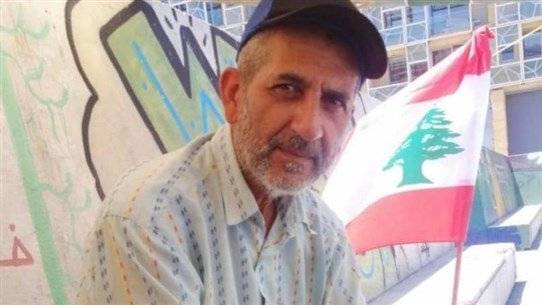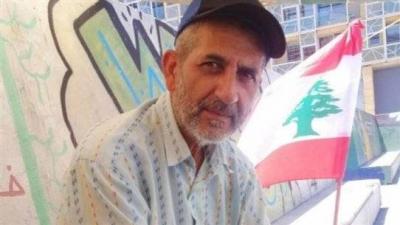Last week, the son of a retired Internal Security Forces member attempted to admit his mother, who is covered by the security forces' health insurance, to a hospital in Bekaa after she contracted COVID-19. The response was that he first had to pay an amount of 10 million Lebanese pounds at the entrance office. This occurred after the family was convinced that the security forces' health insurance had become ineffective, leaving the military personnel to face their fate. This incident is one of many that represent the tragedy facing employees and military personnel, whose salaries do not exceed $90. Among them is Ahmad Mahna, a retired first sergeant from the Internal Security Forces, originally from Rashaya, who decided to express his pain and sorrow for his country and its deteriorating living and social conditions in a different way by going on a hunger strike and sit-in at the Martyrs' Monument in downtown Beirut.
At 59 years old and a father of three, Ahmad has completed his 15th day without eating. His strength and reason for enduring, as he told MTV, come from consuming some liquids or ayran based on medical advice, along with a cigarette to help him during the long hours he spends in the square, seeking shade under a small cloth. However, the Beirut Governorate refused to allow him to set up a tent for shelter.
No official has inquired about him during these two weeks, not even those concerned with his case who are required to acknowledge his pain and needs. However, the level of despair and frustration that this man experiences led him to raise his voice beyond the daily bread and sustenance issues facing military personnel and retirees, pointing to the wound of this country afflicted by various diseases and ailments. "Our problem lies in political sectarianism, and what we need most is an intellectual and humanitarian renaissance," Mahna says, adding, "Frustration and the loss of national and human dignity push you to do this. We are dying slowly."
"I have no personal demands, but my message is to the people and for awareness," Mahna summarizes his strike, speaking with sorrow about his situation and that of his colleagues, some of whom visit his sit-in to express their support. He continues with emotion, stating that he might be able to survive, but "at this stage of my life, why should I extend my hand to people?" He calls for improving salaries for public sector employees, especially security personnel and retirees, and for covering their healthcare costs again, as retirees are unable to pay significant amounts.
While Mahna raises many signs detailing various demands, he emphasizes that the primary demand and the focal point of his requests is to prioritize the interests of the citizen, as it is for the human being that these demands are made, and for achieving these demands that the struggle takes place.
He hopes that Ahmad's voice, which speaks the pain of thousands silently suffering, especially military personnel who are compelled to work during their "official leaves," will be heard. The pain has grown significantly, not just Ahmad's, and it is shameful that 15 days have passed with a citizen on a hunger strike in the heart of the capital without at least one responsible official’s voice being heard.




